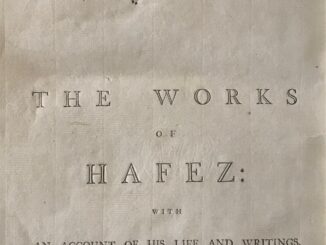Mark McKillion, Ulster University MA History graduate and volunteer for the Library in 2022, carried out research on John Calvin’s Institutio Christianae religionis, Iohanne Caluino authore. … (1568) (object ID P001446785).
You can adopt this book for £250, and support the work of the Library, caring for our wonderful collections, and inspiring present and future generations!
John Calvin has been recognised as one of the leading figures in Geneva during the Protestant Reformation, with John R. Franke placing emphasis on how his ideals would have reflected the greater historical changes behind the interpretation of the Word of God, as the Church itself is always reforming (eccle sia reformata et semper reformanda).
Calvin himself supports this philosophy within his text, Institutes of the Christian Religion, by stating that “nearly all the wisdom we possess, that is to say, true and sound wisdom, consists of two parts: the knowledge of God and of ourselves;” in short, he explains that the nature of theology is not to simply pass down past knowledge of God as part of a tradition, but rather to fully honour that tradition by adapting it to be understood and interpreted by those living in a particular era.[1]
In Calvin’s case, Institutio Christianae religionis was a means for him to express his interpretation of Christian doctrine from a Protestant perspective.
Wilhelm Pauck gives an example of this by noting Calvin’s intent on proving his loyalty to the Catholic king, Francis I of France, as he declares his desire to fulfil “the maintenance of God’s glory unimpaired in the world, the preservation of the honour of divine truth, and the continuance of the Kingdom of Christ uninjured.”[2]
Nevertheless, Calvin remains true to his Protestant ideals, as he places a strong emphasis on an intellectual and moral culture, a sentiment that would have been shared by his peers in Geneva, as he states that if the Christian faith “is the only fountain of truth, we shall neither reject nor despise the truth itself, … unless we wish to insult the spirit of God.”
This is supported by Gustav E. Mueller, who compares the Word of God’s role in the Old Testament as ‘the moral law’ to Calvin’s approach, who states that a Protestant can overcome his sins by understanding that upholding the moral law requires “the love and respect of God and the love of man as child of God.”[3]




